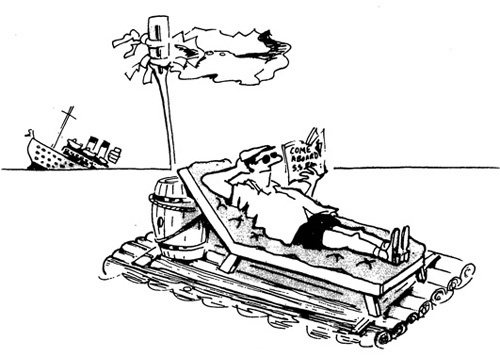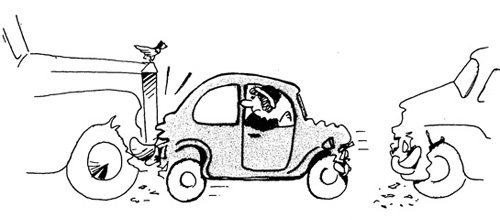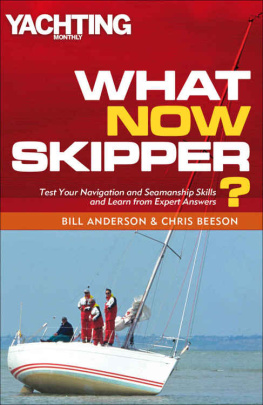
Contents
A.l
From the famous classification A.1 at Lloyds which described the construction of a merchant ship as being of the highest quality. Coincidentally the same understanding is given today to what was formerly the highest qualification of warship first rate. A First Rate ship was one with 100 guns or more spaced over three decks. Admiral Nelsons Victory was a first rate ship of the line. Another expression with the same meaning is top drawer. This came to be used because the ships documents and important papers were always kept in the top drawer.
Above Board
Literally the wooden boards of planking which make up the deck. Any activity which went on above boards would be in the open for everyone to see. Thus it has come to mean honest and fair dealing.
Adrift
At the will of the wind and tide. Sailors began to use the word to describe anything which had become undone or gone missing, which is how it acquired its shoreside meaning of somebody late, lost or wandering in their mind. From this word has also come drifter, a person with no aim in life.
All My Eye (and Betty Martin)
The English never try very hard to get their tongue around a difficult foreign word or phrase, much easier they find to anglicise it. Thus Oh Mihi Beate Martine, an expression frequently used by Portuguese sailors fighting alongside the British in the Peninsula at War, became All My Eye in Betty Martin. For the Portuguese it invoked the help of the blessed Saint Martin known for his charity; for the English it meant bullshine.

Adrift
Aloof
From the old Dutch word loef, meaning windward. It was adopted by English sailors in the 16th and 17th centuries, and in books of old voyages it is written variously as aluffe, a-luff and aloof. Describes a vessel which is sailing along a lee shore with her head pointing high into the wind to prevent her being set inshore; also said of a vessel amongst a fleet of ships which sails higher into the wind so that she draws apart. Thus it has come to mean one who stands apart.
Back and Fill
From the long and tedious operation of getting a large sailing ship to change tacks in light or fickle winds when the crew would have to back the fore and aft sails so that the wind could fill on their reverse side and help to blow the ships head around. Systematic backing and filling was also used as a way of holding the ship steady in one position.
Bamboozle
The word first appears in print in the early part of the 17th century where one authority suggests it was the name of the Spanish custom of hoisting false flags to deceive or bamboozle their enemies. Certainly that was the general understanding throughout the 18th and 19th centuries, although the word also made an appearance in fairgrounds where it was the name of a betting game in which the showman placed a pea under one of three jugs and players had to guess which.
Barcarole
A song with slow tempo and sad refrain of Venetian origin. It comes from the Italian barca, a small boat and barcaruoli which was the name given to the men who sang and rowed the gondolas through the canals of Venice.
Beaker
Spelt barrico. From the Spanish barrica, a wooden water keg found in a ships boat. Shoreside, it has become a beaker, another name for a mug or cup.
Beam Ends
A ship on her beam ends is one about to sink, i.e. laid over on her side so far that her beams, or deck supports, are in the water. It was an expressive way for the sailor to say he was broke and the expression still means impecunity. Good name for a country cottage.

Backing and filling
Bearing Up
One of several colloquialisms which describes a sailing ships heading relative to the wind, or to another vessel. A ship is said to bear up when she brings her head closer into the wind; when she bears away it means she is steering further from the wind. To bear down is to steer towards an object and frequently this meant an enemy ship, hence the suggestion of a threat; while overbearing meant simply to come close.
Between the Devil and the Deep Blue Sea
The devil was the name given to a seam between two planks which every so often had to be payed or repacked with oakum and pitch to prevent it from leaking. All seams need this routine treatment but the devil seam was the most difficult to do and so called because of it! There remains some conjecture as to which seam it actually was, devil is not a word which has survived and nobody can remember any old hands ever speaking of it. Some believe it lay next to the keel and suggest that the seaman who payed it would have to hang from a rope, suspended between the devil and the deep sea. But the more likely explanation is that it was the outside seam of the deck planks next to the scuppers. This would have made it the longest seam and also the most difficult to do due to the spray coming over the side. It also gives more sense to the expression because in bad weather a man knocked over by a sea would be washed into the scuppers to find himself literally between the devil seam and the deep sea. Another expression, the devil to pay, supports this. Originally it ran The devil to pay and no hot pitch and refers to the misfortune of either running out of pitch while paying the longest seam, or having it cool too quickly in what must have been a most exposed and draughty position. The word pay is from the French piox meaning pitch.
Betwixt Wind and Water
The waterline area of a sailing ship and the most vulnerable part of the ship during battle. To be hit between wind and water would be to suffer serious damage and it was always the prime target of the opponents guns. George Bernard Shaw referred to his rumbling indigestion as a cave of the winds and waters, although that is not quite the same thing.
Bilge
Rubbish talk which some wit long ago likened to the residue and cargo sweat which collected in the bilge compartment where the ships sides curve around to the bottom.
Bitter End
The name given to the innermost end of the anchor rope, so called because it was secured to a set of bitts or large pillars of oak bolted and fixed upright to the deck. In controlled circumstances an anchor rope is allowed to run out a measured amount until the anchor hits the sea bed, whereupon it is checked. However, if the water is a lot deeper than expected or things go wrong, then the rope will keep running unto the bitter end. After that there is nothing left!

Beam ends
Black Books: to be in somebodys
Refers to the Admiralty Black Book which dates from the 14th century and is preserved in the Public Records Office near London, England. Its full title is Rules for the Office of Lord High Admiral; Ordinances for the Admiralty in Time of War; the Laws of Oleron for the Office of Constable and Marshall; and other Rules and Precedents
Next page










